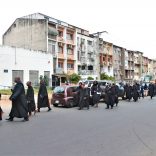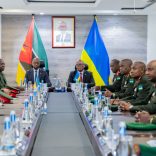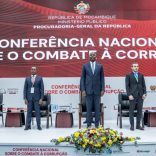Mozambique: Lawyers take to the streets, demand justice for Elvino Dias
President announces names for peace talks in Mozambique

Noticias / Filipe Nyusi, President of Mozambique
President Nyusi yesterday revealed the names of the individuals in the two new groups that will discuss decentralization and military affairs in peace negotiations in Mozambique, according to a statement sent to Lusa news agency.
Filipe Nyusi has appointed university jurists and professors Albano Macie and Eduardo Alexandre Chiziane to represent the government in discussions regarding decentralization, one of the main points of the negotiations agenda.
Eduardo Chiziane was part of the government delegation in the previous phase of negotiations with the Mozambican National Resistance (Renamo).
According to the statement, Renamo leader Afonso Dhlakama has appointed jurist and deputy Saimone Macuiana and former member of the National Elections Commission Maria Joaquina, who were also part of the negotiations in the previous phase of negotiations.
As regards military matters, Armando Alexandre Panguene, a general in reserve and the first ambassador of Mozambique to Portugal, and Ismael Mussa Mangueira, honorary consul of Slovakia in Maputo, will represent the government, while André Joaquim Magibire, member of parliament for Renamo, and Leovilgildo Buanancasso, a member of the State Council, are the choice of the leader of Mozambique’s largest opposition party.
The two groups have the task of following up the work begun in the previous round of negotiations with the help of an international mediation team.
During his speech at the Mozambican Heroes’ Day ceremony in Maputo on Friday, President Nyusi announced the end of international mediation in the peace negotiations, saying that the mediators would be asked to participate in the talks only if deemed necessary.
The work of the Joint Commission in the government-Renamo talks led by the international mediation team was suspended in mid-December without agreement on the decentralization package and the cessation of military hostilities, two of the key themes of the peace negotiations.
At the time, the mediation team’s EU-appointed coordinator, Mario Raffaeli, said that the mediators would only return to Maputo if summoned.
Despite the lack of agreement between the two delegations, the parties reached a truce later as a result of telephone conversations between the Mozambican president and the Renamo leader. At the end of December, the Renamo leader declared a one-week truce as a “goodwill gesture,” and later extended it to 60 days to make room for negotiations.
In addition to the decentralization package and the cessation of hostilities, the negotiation agenda includes the de-politicisation of the Defence and Security Forces and the disarmament of the opposition’s armed wing and their reintegration into civilian life.
Mozambique is undergoing a political crisis which pits the government against the main opposition party and which has plagued the centre of the country with clashes between the Defence and Security Forces and the armed wing of Renamo. The opposition party claims victory in the general elections of 2014, accusing Frelimo of remaining in power for more than 40 years by means of electoral fraud.












Leave a Reply
Be the First to Comment!
You must be logged in to post a comment.
You must be logged in to post a comment.